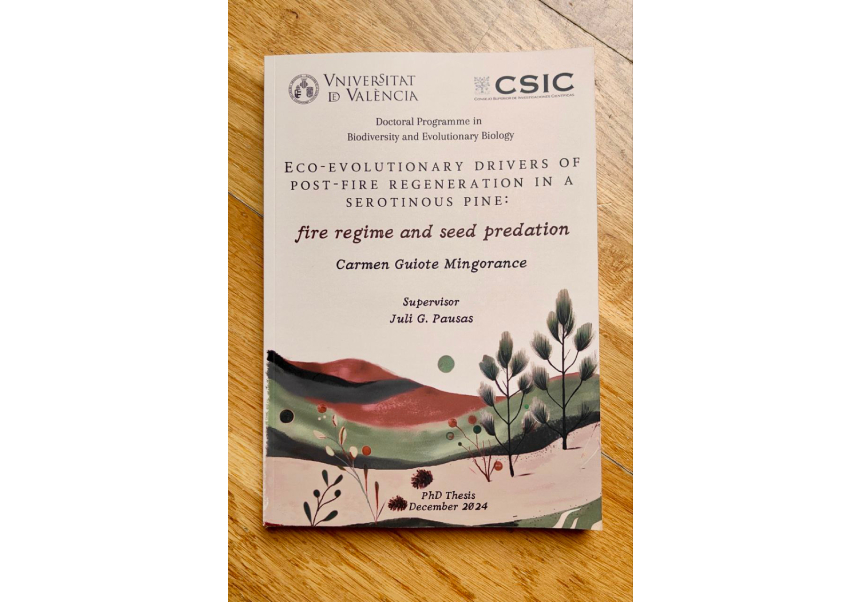
- Date and time: June 27th at 11:00.
- Place: Assembly Hall of the Instituto Valenciano de Investigaciones Agrarias (IVIA). Road CV-315, km 10.7 (Ant. Road Moncada-Náquera, km 4.5) 46113-Moncada, Valencia.
- Title: Eco-evolutionary drivers of post-fire regeneration in a serotinous pine: fire regime and seed predation".
- Directors: Juli G. Pausas
- Affiliated University: University of Valencia.
- Summary: Fire is a natural ecological process that has shaped ecosystems for millennia, driving biodiversity and influencing species distribution. Although Mediterranean species are well adapted to fire, the resilience of these ecosystems to novel climatic and ecological conditions due to global change remains uncertain. This thesis investigates the key factors that promote or hinder post-fire recovery, focusing on the emblematic Mediterranean serotinous pine Pinus halepensis Mill. (Aleppo pine), whose reproduction is closely linked to fire. Serotiny, the accumulation of a seed bank in the canopy within woody structures until fire heat triggers their release, is a highly advantageous trait in fire-prone environments, allowing massive recruitment after fires. However, serotiny is only adaptive when fire intervals between fires fall between the age of reproductive maturity and the life expectancy of the plant.
Despite its importance, the role of sexual precocity in the maintenance of populations remains poorly explored. This thesis tests the hypothesis that short intervals between fires will favor individuals with early reproductive maturity within populations, promoting this trait in subsequent generations as an adaptive mechanism in the face of fire. Our findings show that precocity is strongly linked to local fire activity, with individuals in areas of high fire frequency reaching reproductive maturity earlier than those in areas of low frequency. This earlier reproduction allows for greater seed accumulation in the canopy through serotiny, enhancing post-fire regeneration potential.
However, serotinia also provide a food source for predispersive seed predators, which may counteract their benefits. Therefore, in this thesis we also explore the role of predispersive seed predation in shaping post-fire regeneration potential. Our results indicate that squirrels select and prey more on highly serotinous individuals, reducing the frequency of serotiny in populations with high predation pressure. In addition, defensive traits in cones evolve to mitigate predation, but these adaptations reduce seed production, further limiting the seed bank. In summary, this thesis highlights the role of fire regime and seed predation as key selective forces shaping the regenerative success of P. halepensis populations in Mediterranean ecosystems. Understanding how these factors act and interact is crucial in the current context of global change, which poses increasing threats, especially to Mediterranean ecosystems. We hope that this work will contribute to the development of ecosystem management strategies to improve the resilience of populations under future climate scenarios.
CIDE Communication









